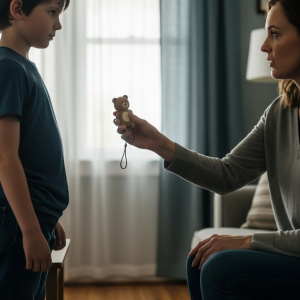Two years ago, my son Sam and I escaped. We weren’t running from a kidnapper or a tangible monster. We were running from our own home, from the screams that echoed in the empty rooms, from the slamming doors that shook the picture frames on the walls, and from the cold shattering of a promise made before God and family.
My divorce was not a civilized uncoupling. It was a war of attrition, a loud, bitter mess fueled by my ex-husband Mike’s reckless business decisions and his bruised ego. He had thrown our life savings into a failed startup, and when it all came crashing down, he turned our home into a battlefield.
The invisible scars of that war were etched deepest on the tender soul of Sam, who was then only nine. He had been a lively, chattering boy. But then he grew quiet. His laughter became rare, replaced by a nervous flinch at every loud noise. He started building forts. In the living room, in his bedroom, pillows and blankets were erected into flimsy walls. That’s where he would retreat whenever our arguments began. One evening, after a terrible screaming match about unpaid bills, I found him curled up inside a pillow fort, his hands pressed tightly over his ears, his eyes squeezed shut as if by not seeing or hearing, the outside world would simply disappear.
The final straw came the night I discovered Mike trying to drain the savings account I had set up specifically for Sam’s college education. “It’s my money too!” he roared when I confronted him. “I need it to rebuild my career! He’s years away from college!” He didn’t understand, or refused to, that he wasn’t just trying to take money. He was trying to steal our son’s future.
That same night, after Mike had stormed out, I sat beside Sam’s fort, lifted the blanket, and whispered, “Sam, should we go somewhere quiet? A place with no yelling.” He just looked at me, his eyes wet with tears, and gave a small nod.
And so, we packed our lives into cardboard boxes. I sold almost everything, keeping only the necessities and irreplaceable mementos. As we drove out of the city, I watched in the rearview mirror as the familiar skyscrapers shrank and vanished. I felt like I was shedding an old, painful skin. Sam sat silently in the passenger seat, never once looking back.
We drove to the North, to the town of Meadow Creek, a place I only knew from “Best Places to Raise a Family” articles. It was so quiet that when I turned off the car engine on our first night, I could hear the rustle of leaves on the pavement, a sound I hadn’t heard in years. No sirens, no loud music from next door. Just peace.
But the main reason I chose this place, the crown jewel of Meadow Creek, was Northgate Academy.
Before deciding to move, I had driven the three hours alone just to see it. I parked across the street and sat in my car for a full hour, just watching. It was even more impressive than its website. Northgate wasn’t just a school; it was a pipeline, a self-contained ecosystem that promised to nurture a child from their first ABCs to the day they received their college acceptance letters.
Its heart was the old, stately red-brick high school building, perched on a small hill like a fortress of knowledge. Connected to it were two newer, more modern wings for the middle and elementary schools, with large windows and a brightly colored playground.
From my vantage point, I could see it all. The youngest children screaming with joy on the slides. A little farther off, middle schoolers walked in small groups, chatting. And then, the most majestic of all, the high school students, emerging from the main entrance of the old building, looked confident and mature.
This place, I thought, is where Sam would be safe. He could grow up in a single, stable environment, surrounded by the same community until he was an adult. Northgate was a perfect picture, with the American flag flying proudly and the motto elegantly displayed on its wrought-iron gates: “Heritage, Honor, Success.” It was everything I dreamed of for my son’s future, three words my old life lacked.
Northgate was more than a school; it was a promise. A promise of an environment where academic achievement was revered, where gleaming championship trophies in glass cases testified to teamwork and discipline. It was a promise of an affluent, influential parent community—people who drove polished SUVs and spoke the language of confidence and power. I didn’t covet their wealth, but I craved the stability they possessed.
I believed Sam would be protected here. Within these solid brick walls, he would no longer need to build forts out of pillows. Here, among children with bright futures, my son would forget the ghosts of a failed marriage. This was a safe place. This was the perfect place to start over.
I bet our entire future on that perfect facade. A gamble that I would later realize I had lost from the very beginning.
I am a freelance graphic designer who works from home, and my old sedan looked utterly out of place in the school parking lot during parent-teacher conferences. I didn’t belong here. I wasn’t part of the country club set, didn’t vacation in Aspen. I was an outsider, and that status gave me an objective perspective but also made my voice small and easily dismissed.
For the first two years, everything seemed to be just as I had hoped. Sam gradually settled in. He was a smart, quiet boy with a boundless curiosity. He wasn’t a sports star or a standout student, but he had friends, good grades, and a particular fascination with history and “forgotten places.”
But Northgate, like many seemingly perfect things, hid its own decay. The school was over eighty years old. The fresh paint on the hallway walls only concealed the hairline cracks beneath. The old heating system often groaned and whined like a mournful cry during the long winter months. And at the center of that decay, both literally and figuratively, was the old basement.
It had originally been a bomb shelter from the war era, but for decades it had been sealed off and used only for storing broken furniture. The only entrance was a heavy steel door at the end of the physical education corridor, always secured with a large padlock. Sam and his friends would whisper about it, weaving ghost stories about buried secrets. To me, it was just a harmless part of the school’s culture.
I didn’t know that this forgotten place was the perfect stage to hide a crime.
The man in charge of that stage was Principal Edward Thompson. He was the living embodiment of Northgate: elegant, reputable, and respected. In his late fifties, with meticulously combed salt-and-pepper hair and wrinkle-free suits, he had a deep, soothing voice and a firm, confident handshake. His smile was professional, but his eyes were sharp and probing, lacking genuine warmth. He had run the school for twenty years, turning it into a symbol of perfection. To the parents, he was a dedicated educator. To me, he was the guardian of my son’s safety.
And then there was his son, Kevin Thompson, a perfect product of Northgate. If Principal Thompson was the king, Kevin was the prince. Seventeen years old, captain of the football team, student body president, with near-perfect grades and a bright future at a top-tier university. He was handsome, charming, and beloved by the entire school. In meetings, Principal Thompson often mentioned Kevin, not with the simple pride of a father, but almost with the admiration of an artist for his most perfect sculpture.
But I had once caught a glimpse of a crack in that perfect sculpture.
It was an autumn afternoon, and I was waiting in my car for Sam. I saw Kevin in the parking lot, laughing with his popular friends, the sunlight making his blond hair shine. Just then, a skinny, bespectacled boy, struggling with a tall stack of books, stumbled and fell. Books were scattered across the pavement.
And for a fraction of a second, before anyone else noticed, Kevin’s mask slipped. The smile vanished. It was replaced by an annoyed frown and a look so cold it was chilling. It wasn’t just disdain; it was the irritation of a king being inconvenienced by a commoner.
Instantly, the mask was back on. He walked over, picking up the books with flawless grace. “Careful there, buddy,” he said, his tone friendly with a hint of teasing. “Don’t want to let everything fall apart.”
The other boy stammered his thanks and hurried away. Kevin returned to his friends, and they resumed their laughter. But as he turned his back, I saw him give a slight smirk and roll his eyes. The entire act of helping had been a performance for the audience. That look, combined with his double-edged words, planted a vague sense of unease in me, a feeling that this golden boy had a darkness he hid very well.
I dismissed it soon after, telling myself I was being too sensitive. That was my first mistake.
It all began on a Tuesday afternoon. Sam came home later than usual. He wasn’t chattering about his day at school like he normally did. He quietly put down his backpack, got a carton of milk from the fridge, and sat at the table without a word.
“What’s wrong, honey?” I asked, placing a hand on his shoulder. “Did something happen at school?”
Sam looked up at me, his eyes wide with the mixed excitement and confusion of a child who has stumbled upon an adult secret.
“Mom,” he whispered. “I went into the old basement today.”
My heart skipped a beat. “What were you doing in there? That place is off-limits, Sam.”
“The door was unlocked,” he explained, his voice still hushed with mystery. “Jason and I just wanted to take a look. It was dark and dusty. But that’s not the weird part, Mom.” He paused for dramatic effect. “I saw Principal Thompson down there. He was alone.”
I frowned. “What was the principal doing down there?”
“I don’t know. But he was holding a box. An old wooden box with a lock on it. And…” Sam hesitated again, “and he was crying.”
That last detail stunned me. Principal Thompson, the ever-composed, powerful man, crying alone in a dusty basement?
“He hid the box behind a stack of old desks and then hurried back up. I don’t think he saw me. But it was so weird, Mom. Why would he hide a box and cry like that?”
That night, I couldn’t sleep. Sam’s curiosity was contagious. The story was just too strange. Why would a principal need to secretly hide something in an abandoned storage room? And why would he be crying?
The next day, I decided I had to get to the bottom of it. I called the school and made an appointment with Principal Thompson, using the excuse of wanting to discuss Sam’s academic progress.
His office, like the man himself, was impeccably clean and organized. He invited me to sit, his smile as professional and warm as ever. I carefully recounted Sam’s story, trying not to sound accusatory.
When I finished, Mr. Thompson’s smile didn’t waver. He steepled his fingers on his desk and looked at me with the patient gaze of a therapist.
“Anna,” he began, his voice still soothing. “I completely understand your concern for Sam. But he does have a very active imagination, doesn’t he?”
I was taken aback. “What do you mean?”
“Well, the basement is, in fact, being cleared out for an inventory of old equipment. I have been down there a few times to supervise. It’s possible Sam saw me moving some boxes of old files. And you know how children are these days, with all the movies they watch. A dark basement, an old box… it’s easy for them to spin a mysterious tale.”
He spoke so smoothly and logically that I began to doubt myself. Had Sam really imagined it?
“As for me… crying,” he let out a small, self-deprecating chuckle. “The air down there is incredibly dusty, Anna. I have a rather severe dust allergy. My eyes were probably red and watering a bit, and Sam must have misunderstood.”
He skillfully turned me into a paranoid, overprotective mother. He reassured me that Sam was a fine student and that he would “keep a closer eye” on him. I left his office feeling foolish and embarrassed. I had bothered a respected educator over a child’s tall tale.
On my way to the parking lot, I was still berating myself. Suddenly, a soft voice called out from behind me.
“Anna?”
I turned around. It was a young teacher with a kind but worried face. I recognized her as Jessica Miller, the English teacher. She had been Sam’s homeroom teacher last year.
“Hi, Ms. Miller,” I said, surprised.
She glanced around nervously, as if afraid of being watched. “I’m sorry to bother you. I… I couldn’t help but overhear your conversation with the principal.” She hesitated, clutching her bag. “I just wanted to say… you should believe your son.”
“What do you mean?”
Ms. Miller took a deep breath. “Last year, a student in my class, Emily Sanders, went missing. They said she ran away. But before she disappeared, she had a major conflict with… with Kevin Thompson.”
The principal’s son. That cold look in the parking lot flashed in my mind.
“Emily said Kevin was cruel,” Ms. Miller continued, her voice trembling. “She was trying to gather proof that he was bullying other students. I reported my concerns, but the principal dismissed them, saying I was paying ‘undue attention’ to his son. And then… Emily vanished.”
She looked at me, her eyes filled with torment. “After you left the office, I saw the principal hurry down toward the gym. I… I followed him. I saw him go into the basement. The door was slightly ajar. I waited until he left, and then I slipped in.”
My heart was pounding.
“I found the box, Anna. It wasn’t locked. And what was inside… oh God…” Ms. Miller closed her eyes, as if trying to erase a horrible image. “Inside… were Emily Sanders’ things. The girl who went missing. I recognized her star necklace. I was so scared. I just managed to raise my phone, intending to take a quick picture and run.”
She took out her phone, her hands shaking, and sent me a file. “He is not who he seems to be. Please be careful.”
A “ping” sounded from my phone.
“I have to go now,” she said and hurried away, almost running.
I stood frozen in the parking lot, watching her until she was out of sight. Then, trembling, I opened my phone, my heart racing. It wasn’t a still photo. In her panic, Ms. Miller must have accidentally held the shutter button a little too long, and her phone had automatically recorded a few seconds of a “Live Photo.”
The clip was short and shaky, but it was enough. Inside a wooden box, I saw a pink diary, a butterfly hair clip, and the silver star necklace Ms. Miller had mentioned. But the object that caught my attention was a cell phone lying in the middle. Its screen was lit up.
I held my breath, pressing my face closer to my phone’s screen. And then, the impossible happened. Because it was a short clip, the image on the phone within the video was also moving. I saw a face. The face of a young, blonde girl, her eyes filled with tears, her mouth open in a silent scream.
It was Emily Sanders. I recognized her. Her face was framed in a small picture in the school library’s memorial corner, dedicated to the “beloved student who ran away.”
But the most horrific part was yet to come. From my phone’s speaker came a faint, horrifying, crackling sound, the audio my teacher’s phone had picked up in those few short seconds. It was a high-pitched, arrogant male voice, coming from the phone in the box:
“…Go on and cry, Emily. Cry louder. No one is going to hear you…”

And that voice, though distorted through two layers of phone speakers, I recognized it. It was the voice of the golden boy, the prince of Northgate.
It was Kevin Thompson’s voice.
My world shattered. I collapsed into the seat of my car, a wave of nausea rising in my throat. A child’s story. A respected principal’s cover-up. And now, a picture. A picture of evidence from a kidnapping, torture, and possibly murder. A snuff film. Filmed by a teenage psychopath, and hidden by his own father.
The safety I had sought in Meadow Creek was an illusion. The monster wasn’t out there. It was right here, walking the clean halls of Northgate, sitting in class with other children, shielded by reputation and power. And my son, with his innocent curiosity, had just poked the devil’s den.
The initial shock gave way to a cold resolve. I was no longer the weak, scared single mother. My child was in danger.
My first instinct, like anyone in this situation, was to grab the phone and dial 911. My finger was already hovering over the screen, ready to connect with the local police department. But something, a cold sliver of reason amidst the sheer panic, stopped me. I took a deep breath, forcing my screaming brain to stop and think. The local police?
In a small town like Meadow Creek, the network of relationships was like an invisible spiderweb, and it was easy to guess who the spider at the center was. Principal Thompson, after twenty years of building his image as a community pillar, wasn’t just an educator. He was a force. The police chief’s daughter was the head cheerleader at Northgate. The mayor had just cut the ribbon for the school’s new science lab last month, his speech full of praise for the “vision of my friend, Edward Thompson.”
I pictured the scenario. I would call, my voice frantic, accusing the most respected man in town of being an accomplice to murder. The dispatcher, probably a Northgate parent himself, would take down the information. But would he immediately send a squad car? Or would he make another call first? A “courtesy” call, a “heads-up” to the “esteemed principal” that a “distraught mother” had just called.
Fifteen minutes. That’s all he would need. Fifteen minutes of warning, and that box, along with the phone containing the horrific video, would disappear forever in his incinerator. The only physical evidence would turn to ash.
And then the police would arrive. They would conduct a cursory search and find nothing. And then the story would be flipped. Edward Thompson, the poor victim, was slandered by a paranoid single mother. They would look into my divorce. They would question my son, terrify him, make him doubt his own memory. I wouldn’t just lose the evidence; I could lose my son.
No. I couldn’t bet justice for Emily and Sam’s safety on a system that was likely rotten from the inside. I had to go around it. I needed an outsider like me, but one with power. Someone with the authority to break the spiderweb from the outside, not get caught in it. Someone who would believe me unconditionally, not because of who I was in this town, but because of our relationship. Someone I could trust completely.
And in my mind, amidst the chaos of fear and anger, only one name emerged clearly: David.
I called David. He had been my ex-husband’s best friend, but had remained a good friend to me after our divorce. More importantly, he was a detective with the state police, a unit completely independent of the local force.
I sent him the picture and summarized the entire story in one breath. There was a long silence on the other end of the line.
“Anna,” he finally said, his usual friendly tone gone, replaced by a sharp, authoritative edge. “Listen to me. Lock all your doors. Don’t go anywhere. Don’t talk to anyone. My team and I will be there in two hours. Don’t worry, we’ve got him.”
Those two hours were the longest of my life. I picked Sam up from school, trying to act normal, but my heart was pounding like a drum. I took him home, locked the doors, and drew all the curtains. I held my son tight, breathing in the smell of his hair, and prayed.
True to his word, a fleet of unmarked cars rolled silently into town as dusk fell. David had arrived, along with six other detectives. They used no sirens, drew no attention. They were ghosts in the twilight.
The plan was laid out quickly and precisely. They needed an emergency search warrant, and my picture was the legal basis for it. They wouldn’t raid the Thompson home. The target was the box. The target was the basement.
I will never forget the scene. Under David’s command, the tactical team stormed Northgate Academy. They moved professionally, disabling the security system and sealing off the physical education corridor.
At the same time, another team, led by David himself, went to the principal’s office.
David told me about it later. When they entered, Principal Thompson was there, but he wasn’t working. Next to his desk was a small paper incinerator, the kind used for destroying documents. Smoke was rising from it. He was trying to burn the box.
When he saw the officers, he didn’t resist. He simply slumped into his chair, the face of a man utterly defeated. He must have guessed I wouldn’t believe his story and had rushed to destroy the evidence, but he had underestimated the speed of a single mom.
But the most dramatic arrest took place elsewhere.
Kevin Thompson was arrested in his evening class. When two officers walked in, he was still sitting in the front row, smiling smugly as the teacher praised his essay. He saw them, and the smile didn’t falter. He probably thought they were there to deliver some good news. He was so arrogant that he couldn’t imagine they were there for him.
It was only when an officer read the arrest warrant, with the words “kidnapping,” “torture,” and “homicide,” that his expression changed. It wasn’t a panicked collapse. It was something worse.
The warm, charming light in his eyes went out, leaving only a cold, emotionless, demonic emptiness. The confusion that flickered across his face for a split second was not from guilt, but from the annoyance of having his perfect plan disrupted. Instantly, that confusion was replaced by a silent rage, and the perfect smile twisted into a contemptuous smirk. He wasn’t scared. He was disgusted. He was disgusted by the mere mortals who dared to judge a god like him.
When the officer cuffed his wrists, Kevin gave a short, powerful tug that made the officer tighten his grip. He didn’t scream, didn’t curse. He was silent. His silence was more terrifying than any threat.
As he was led out of the classroom, he didn’t bow his head in shame. He held his head high, walking with a deliberate stride. He slowly scanned the room, his cold gaze passing over the shocked faces of his classmates. He didn’t look at them as a friend, but as a predator memorizing his territory.
Finally, his eyes landed on the English teacher, who just moments before had been singing his praises. She was huddled against the blackboard, her face white, a hand over her mouth. Kevin looked directly into her eyes. And then, he did something that made everyone’s blood run cold. He winked at her. A slow, deliberate wink, full of the promise of unspeakable cruelty.
That was not the face of a lost boy. It was not the anger of someone wrongly accused. It was the true face of the monster, a demon without remorse, simply annoyed at having his fun interrupted.
They found the remnants of the box in the incinerator. The diary was charred, but the phone and the necklace remained. And the video, stored on the cloud, became the ironclad evidence that convicted Kevin Thompson of his heinous crimes.
The scandal exploded like a nuclear bomb in the heart of Meadow Creek. The truth was more horrific than any rumor. Northgate Academy, the town’s pride, became a cursed crime scene. “Heritage, Honor, Success” now sounded like a bitter mockery.
Legally, justice was served coldly. Due to the brutal nature of the crime and the irrefutable evidence, Kevin Thompson, despite being only seventeen, was tried as an adult. He was sentenced to life in prison, with the possibility of parole only after 30 years. In effect, the golden boy would rot behind bars.
Principal Edward Thompson faced a slew of charges: accessory to a felony, obstruction of justice and destruction of evidence. He lost everything: his career, his reputation, his freedom, and the son he had so blindly tried to protect. His multi-year prison sentence was almost a release from the hell of torment he would face for the rest of his life.
But Mr. Thompson’s worst hell was not the four walls of a prison cell, but the inescapable truth in his own mind. Every day, he had to live with the knowledge that his own blind protection had sharpened the fangs of the demon inside Kevin. By tolerating his son’s sick habit of keeping ‘trophies’ from his cruel acts, and by indulging his ego instead of being horrified by it, he had turned a father’s love into a crime. He hadn’t just lost Kevin to the law; he realized he had lost his own conscience the moment he chose to protect a monster over an innocent victim.
As for Sam and me, we became the town’s reluctant heroes. Initially, the victory tasted of nothing but the tragedy of a life lost and innocence tainted. We had exposed the monster, but we also had to face the truth that evil can exist in the most unexpected places, disguised as the most respectable people.
But a year has passed. And we didn’t leave Meadow Creek. Leaving felt like running, and we had done enough running. Instead, we stayed and witnessed something miraculous: a revival. The town stopped trying to hide its scar and learned to heal it. And the heart of that healing, surprisingly, was Northgate itself.
The school board, in a desperate attempt to regain trust from a shattered community, made one single wise decision: they appointed Jessica Miller as the new principal. The shy young teacher who had tremblingly handed me the photo in the parking lot was now a strong, determined leader. She didn’t try to bury the past. She confronted it.
The old motto, “Heritage, Honor, Success,” the hollow prestige that had sheltered a crime, was taken down. In its place, on the main gates, are now three simple but powerful words: “Knowledge, Integrity, Community.”
And the basement, once a tomb of secrets and crime, was completely transformed. Under Ms. Miller’s direction, teachers, parents, and students worked together to repaint the damp walls, install warm lighting, and turned it into a creative arts workshop and a common area. The darkest place in the school was now the brightest and most vibrant. It was a powerful symbol of rebirth.
Sometimes, I still watch my son as he reads in the backyard. But now, the old chill has been replaced by a warm pride. He laughs again, a full, carefree laugh. He has made more close friends, and our backyard is once again filled with the sounds of children playing. His curiosity hasn’t faded, but it has been transformed. Instead of exploring dark places, he now uses it to seek the truth. Sam joined the school’s newspaper club and has become a passionate young writer, focusing on stories of good deeds in the community.
One afternoon, seeing me watching him intently, Sam put down his book and said, “Don’t worry, Mom. We found the monster. Now it’s time to tell other stories.”
And so have I. I am no longer the outsider feeling lost in this town. The truth connected me to others in a way I never expected. I joined the parent-teacher association, working closely with Ms. Miller to develop new counseling programs and anonymous reporting channels for students. We want to ensure that no child at Northgate ever has to speak up in fear again.
The world is not always a safe place; that is an unchangeable truth. Stately red-brick walls cannot keep out the darkness, and elegant smiles can hide the most horrific secrets. But the biggest lesson I learned was not the fear of evil’s existence.
It was the extraordinary power that arises when ordinary people decide to stand for the light. It was the lesson about never dismissing the words of a child, trusting a mother’s instinct and knowing that the most powerful weapon against the darkness is not silence, but the courage to rebuild together from the ashes. Evil may exist, but good people, when they stand together, exist more powerfully.




